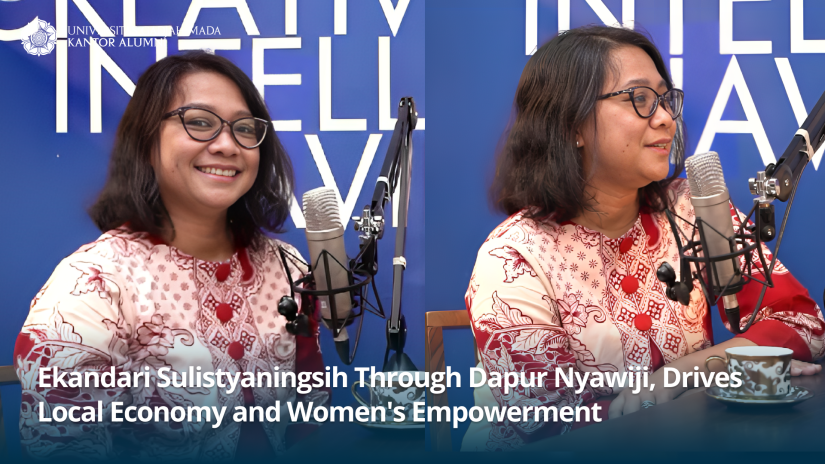
Ekandari Sulistyaningsih, commonly known as Ekan has helped many micro, small, and medium enterprises (MSMEs) affected by the COVID 19 pandemic through Dapur Nyawiji.
Ekan is an alumnus of the Faculty of Psychology Universitas Gadjah Mada. During her time as a student at UGM, Ekan enjoyed outside campus activities. Instead of joining campus organizations, she spent much of her time volunteering with NGOs (Non-Governmental Organizations).
Since 2010, Ekan has continued her career as an office employee. Her life became nomadic, moving to various cities in Indonesia, such as Jakarta, Surabaya, and other major cities. In 2017, Ekan decided to quit her office job for family reasons.
In the same year, Ekan started a homestay business to revive her family’s old house, Ndalem Mangunsudiran. This homestay opened new business opportunities for Ekan. However, when the COVID-19 pandemic hit, Ndalem Mangunsudiran became dormant.
Despite the homestay business being dormant, the staff were not dismissed. Through the staff, Ekan heard many stories of hardship during the pandemic. At that point, Ekan’s spirit to help others was ignited. She gradually helped those close to her who were affected by the pandemic. This is where Dapur Nyawiji was born.
Dapur Nyawiji started when Ekan was entrusted with managing aid for people in self-isolation. She saw that if the aid was not well-coordinated, it would be ineffective. Additionally, Ekan helped small merchants affected by the pandemic by providing training to add value to their products.
According to Ekan, Dapur Nyawiji is a platform where the kitchens in her community unite to revive the stalled economy.
“Dapur Nyawiji unites many kitchens, including reviving and consolidating the economic kitchens affected by the pandemic,” said Ekan in an interview with KAGAMA BICARA #1.
Ekan considers her colleagues at Dapur Nyawiji as business partners, not staff. This makes Dapur Nyawiji more inclusive. This inclusive approach creates a more collaborative and empowering work environment, where every individual feels valued and plays a crucial role in Dapur Nyawiji’s success. The inclusive environment is also an evident that most of Ekan’s colleagues are women.
Some of the products sold at Dapur Nyawiji include local tea (teh tubruk), coffee, traditional snacks, cookies, meatballs, and gudeg. Non-consumable products such as tote bags and batik are also sold at Dapur Nyawiji.
Through various initiatives, Ekan not only revives the local economy but also provides training and support to MSMEs to improve the quality and added value of their products. This helps small businesses survive and even thrive in difficult situations. Dapur Nyawiji exemplifies how communities can unite and collaborate to support and strengthen each other in times of crisis.
Through dedication and innovation, Ekan has successfully built Dapur Nyawiji as a center for local economic empowerment. Her contributions align with SDGs such as women’s empowerment (SDG 5), decent work and economic growth (SDG 8), and responsible consumption and production (SDG 12). Ekan has proven that from adversity, we can create positive change with a broad impact on society.
[Alumni Office: Aldiza, Translated: Syahrul, Photo: UGM Channel]
